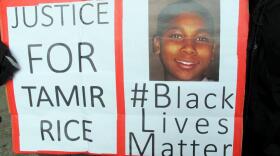A panel gathered with about 40 people at an inner-city Cleveland church last night (Wednesday) to explain one of the least understood parts of the criminal justice system: the grand jury process. And as WKSU’s M.L. Schultze reports , it didn’t take long for the discussion to address one of the most controversial grand jury decisions in recent history.
The grand jury decided not to indict the two Cleveland police officers responsible for the shooting death of 12-year-old Tamir Rice 2 ½ years ago. Panel member and Cleveland Municipal Judge Michelle Earley said prosecutors took an extraordinary step in agreeing to the ground rules for the officers to address the grand jury.
“That is highly unusual, not something that I have ever seen -- that you would allow a witness to come and testify and the ground rules are that they don’t have to answer any questions either put to them by the prosecutor or the grand jury.”

Added a second panel member -- Case Western Reserve law professor Lewis Katz: “It was highly unusual and it was highly inappropriate.”
The grand jury symposium is one of four parts of a series called 'Anatomy of Justice' on criminal justice issues in Cuyahoga County.
After the Rice shooting, Judge Earley was named to a commission by the Ohio Supreme Court to recommend changes in the grand jury process. Most of those recommendations – facing pressure from prosecutors and police – were never adopted.
The "Anatomy of Justice" symposium wass sponsored by the Cleveland Metropolitan Bar Association, City Club of Cleveland and Elizabeth Baptist Church.





